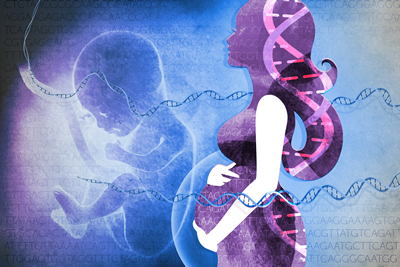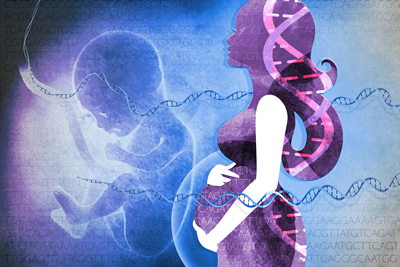But before prenatal whole genome sequencing is adopted, physicians in obstetrics and gynecology (OB/GYN) must wrestle with this technology's practical and ethical issues, according to a new survey of more than a thousand physicians. Researchers with the National Human Genome Research Institute (NHGRI), part of the National Institutes of Health (NIH), published their findings in the December 6th issue of the journal Prenatal Diagnosis.
"Because there are too few genetic counselors, OB/GYNs will be called on to communicate fetal genetic information to parents," said Benjamin Berkman, J.D., M.P.H., deputy director of NHGRI's Bioethics Core and faculty member in the NIH Department of Bioethics. "Our goal was to see how prepared OB/GYNs are for the adoption of prenatal whole genome sequencing and how they view the related ethical issues."
Through a simple blood test, physicians will soon be able to determine the fetus' entire collection of genetic instructions using fetal DNA that floats in the mother's blood. Prenatal whole genome sequencing, though not available now, will provide much more information than revealed by amniocentesis. That's part of the problem: this new testing could include a broader range of results such as information about the small risk of common ailments, adult-onset diseases and incurable conditions. The results also might include non-medical information.

In their survey responses, OB/GYNs were most concerned that receiving complex information about a fetus' genome could increase parental anxiety. This, in turn, could lead to overtreatment of the child and higher costs of care, they said.
OB/GYNs also worried about revealing to parents non-medical information such as learning disabilities or eventual height. Parents might terminate a pregnancy based on relatively trivial characteristics, according to the survey results. One physician wrote, "I do not agree with producing only genetically perfect persons. Milder genetic issues should not be tested." OB/GYNs may feel they should deliver only medical information to parents, researchers said.
Interestingly, older physicians and physicians who scored higher on the genetic literacy scale had less overall concern about bringing prenatal whole genome sequencing into their medical practices.
Physicians with greater overall concern about this technology believed that they should guide the parents toward a particular medical decision. However, directing parents to a specific medical decision runs counter to the standard guidance that genetic information should be communicated impartially.
The survey suggests the need to develop ethics guidelines that are responsive to the concerns of OB/GYNs prior to the adoption of prenatal whole genome sequencing.
"OB/GYNs will be on the forefront of managing prenatal whole genome screening," Mr. Berkman said. "Our research will hopefully help start a conversation about the ethical issues such a paradigm-shifting technology raises and influence the direction of professional guidance documents."




